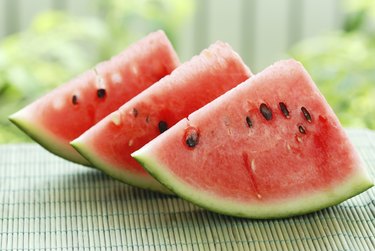
Whether you're an athlete or a casual gym-goer, you know that post-workout nutrition is paramount. One way to replenish your electrolyte stores and stay hydrated after training is to drink watermelon juice. Or, you can replace your post-workout snacks with a fresh slice of watermelon.
Watermelon — A Powerhouse of Nutrition
Video of the Day
This favorite summer treat is chock-full of vitamins and minerals that support athletic performance. With just 84 calories per serving (one wedge), it fits into any diet. What makes it stand out is its high content of potassium, magnesium, calcium and other electrolytes. Each serving provides:
Video of the Day
- 84 calories
- 21.1 grams of carbs
- 1.7 grams of protein
- 0.4 grams of fat
- 1.1 grams of fiber
- 17.4 grams of sugar
- 7 percent of the DV (daily value) of magnesium
- 7 percent of the DV of potassium
- 4 percent of the DV of iron
- 2 percent of the DV of calcium
- 3 percent of the DV of zinc
- 9 percent of the DV of vitamin A
- 25 percent of the DV of vitamin C
- 12 percent of the DV of pantothenic acid
Watermelon is also a good source of beta-carotene, B-complex vitamins, copper and selenium. It boasts potent antioxidants, such as lutein, zeaxanthin and lycopene, which scavenge oxidative stress and fight inflammation. Lycopene, for example, regulates blood pressure, neutralizes free radicals and may protect against cancer, according to the International Food Information Council Foundation.
This fruit benefits gym-goers and athletes in several ways. First of all, it's about 91 percent water, so it may help improve your hydration status after a challenging workout. When you exercise, you lose water through sweat.
Competitive athletes, for instance, can easily lose 2 to 3 percent of their body weight during training, as reported in a November 2012 research paper published in Nutrition Reviews. This may lead to dehydration and affect physical performance.
The U.S. Anti-Doping Agency recommends drinking about 3 cups of fluid for each kilogram lost during exercise — even if you're not feeling thirsty. Watermelon is high in water and counts toward your fluid intake.
Harness the Power of Electrolytes
This refreshing summer fruit and its juice are packed with electrolytes such as calcium, potassium and magnesium. Your body needs electrolytes to flush metabolic waste, maintain nerve and muscle function, transport nutrients and regulate its pH balance. These minerals also regulate the amount of water in your cells and tissues, helping prevent dehydration and overhydration.
Losing just 2 percent of water weight during exercise can impair athletic performance, according to the National Academy of Sports Medicine (NASM). That's about three pounds for a 150-pound person. Electrolytes facilitate water absorption into the body, regulate heart rate and prevent muscle cramps.
Potassium, for example, may help reduce fatigue. Magnesium plays a vital role in energy metabolism and neuromuscular coordination. Calcium keeps your bones strong, supports muscle function and helps transmit nerve impulses through the body, points out the NASM.
While it's true that you can obtain these nutrients from sports drinks, watermelon is a healthier choice. Unlike sports beverages, it has no added sugar, preservatives and artificial sweeteners. Plus, it contains dietary fiber, which helps slow sugar absorption into the bloodstream.
Watermelon Juice Facilitates Recovery
Watermelon is too low in protein to help you build muscle and strength, but it has other perks. This fruit and its juice will keep you hydrated and may help you recover faster from training. These benefits are partly due to electrolytes and partly due to l-citrulline, a naturally occurring amino acid.
According to a small but widely cited study of seven athletes, published in the Journal of Agricultural and Food Chemistry in July 2013, watermelon juice may help relieve post-workout muscle soreness because of its high content of l-citrulline. This nutrient may also help reduce blood pressure and improve cardiometabolic health.
Read more: How to Ease Muscle Soreness After a Workout
Despite its low fiber content, watermelon juice is healthier than typical sports drinks which are usually loaded with sugar and may lead to obesity in the long run.
In general, fruit juices provide less fiber compared to the whole fruit. However, they still have their place in a balanced diet. These beverages are rich in vitamins, minerals and phytonutrients and may improve your overall health when consumed in moderation. They also make it easier to increase your fruit intake, points out the Mayo Clinic.
Whether you eat watermelon for weight loss or for faster post-workout recovery, this fruit is a good choice. It's low in calories and packs a hefty nutritional punch. On top of that, it's a natural source of l-citrulline and electrolytes that support exercise performance.
- USDA: "Nutrition Facts for Watermelon"
- Food Insight: "What Is Lycopene?"
- USDA: "Raw Watermelon"
- Nutrition Reviews: "Dehydration and Endurance Performance in Competitive Athletes"
- U.S. Anti-Doping Agency: "Fluids and Hydration"
- U.S. National Library of Medicine: "Fluid and Electrolyte Balance"
- NASM: "Electrolytes: Performance Perks and Real Food Sources"
- Joslin Diabetes Center: "How Does Fiber Affect Blood Glucose Levels?"
- Journal of Agricultural and Food Chemistry: "Watermelon Juice: Potential Functional Drink for Sore Muscle Relief in Athletes"
- Nutrients: "l-Citrulline Supplementation: Impact on Cardiometabolic Health"
- Pediatrics Child Health: "Energy and Sports Drinks in Children and Adolescents"
- Mayo Clinic: "Is Juicing Healthier Than Eating Whole Fruits or Vegetables?"
- Mayo Clinic: "Mayo Clinic Q and A: Juicing Can Help Increase Your Fruit and Vegetable Intake"